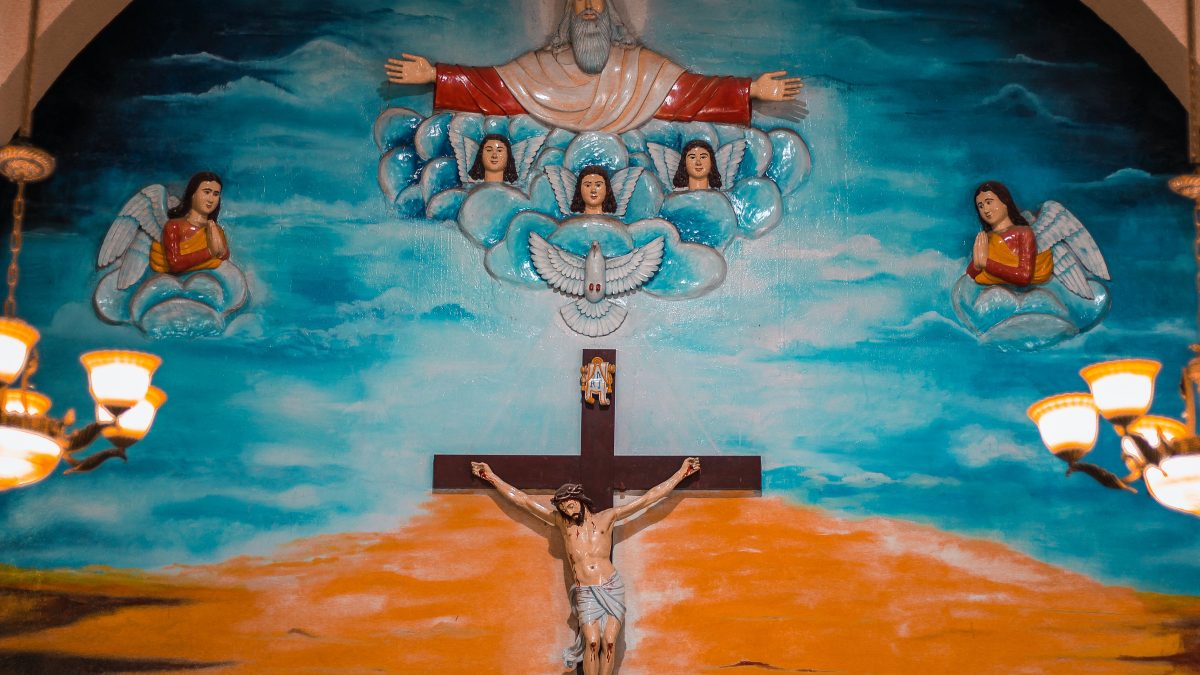
28 May 2023 Sermon
28 May 2023
11/ June/ 2023/ Sermon
11 June 2023Trinity: God of love, grace and fellowship
With your prayers and loving care, I felt very welcome coming home as I landed at Melbourne Airport after a safe journey to Korea.
The main goal of this three-week trip to Korea was to have my father-in-law’s first-anniversary memorial service and to help my mum pack up her home and move into her new place, which is an aged care home. Thankfully, she seems busy because she doesn’t answer my phone calls as she is making new friends and touring every corner of the home.
The season in Korea is the exact opposite of the season in Australia, showing off green everywhere at the early beginning of summer. However, every time I visit, the sky’s colour is smoky because of the dust and air pollution from China’s yellow micro-dust blowing to Korea in densely populated large cities or even secluded surroundings. Even so, while I could still see the rhythm and beat of God’s creation through the sky, I realized that it was the task given to the Christian to take care of and preserve the earth God created. We must actively participate in a net-zero emissions policy that many countries are trying to implement to reduce the greenhouse gases which are causing global warming. The Uniting Church in Australia is also committing to this new climate action Plan to encourage action across the Church.
“What is three in one, one in three?”
You may have heard of the riddle of the Sphinx, the monster that took the strangers’ lives: ‘What is four in the morning, two in the afternoon, and three in the evening?’ A similar question is: ‘What is “three IN one”, and “three ARE one”? Yes, it is Trinity, there is one God who eternally exists as three distinct Persons, the Father, Son and Holy Spirit.
‘In the beginning when God created the heavens and the earth’
Last Sunday, we worshipped on Pentecost Sunday; today is Trinity Sunday. The very opening of the Bible is a powerful declaration in Genesis chapter 1:1, ‘In the beginning’. God’s creation event has a fundamentally different start from the creation as a historical reality that is spoken of in natural science today.
While science asks HOW the universe came to be, the Bible asks the WHY of God’s relationship with creation. Creation, from chaos and void to light, is summed up in one word: “It is good!” Perhaps chaos and the void are akin to the Big Bang or the Black Hole in today’s science. Science never says “good“ or “bad,“ but in this text we hear “it is good!” – the one relationship that can never be separated between the Creator and the created.
The Trinitarian conviction that God exists as Father, Son, and Holy Spirit, but is one God, is at the heart of our Christian faith. The claim is that there is one God, but God manifests his form and activity through three independent Persons, and those three persons are ultimately one God. I know that logic may sound absurd to some, and it is a very strange doctrine that the Father, the Son, and the Holy Spirit are different but fundamentally one God. If we do not understand this mystery well, we need not blame our faith for being weak. We do have assurance: the assurance that my weak and flawed faith is sufficient. Assurance that spirituality and honesty go together – that we can be honest about our doubts. Assurance that we can experience the Spirit not only today but also when we leave the climax of Pentecost and enter into Ordinary Time.
Assurance that we can experience the risen Christ even when the resurrection seems impossible to me. Confidence that we can experience the relational Triune God, even as we are confused and unsure whether we can even make sense of the concept of the Trinity. And we have words of permission. Permission to worship even in doubt. Even if you are not familiar with the meaning of Holy Spirit, allow yourself to find meaning in your experience. And permission to participate in the Christian community even when we have questioned many Christian teachings and are often unsure of what we believe. Permission to come to the table, not because I am sure of what I believe, but simply because Christ invited me. Permission to proclaim the gospel, to shout out the good news of the kingdom of God, and share it with others, not because we hold to this truth, but because it holds us despite our doubts, and it inspires and moves us, and we cannot deny the truth of it. They are words of permission to baptise in the name of the Father, Son and Holy Spirit; to celebrate and proclaim the experience of the Triune God, even as I lack the ability to speak coherently about the Trinity.
Finally, I remember last year I brought this picture. Andrei Rublev, a 16th-century Russian monk and painter, described the famous Trinity as the fellowship with strangers at a meal table. We see the Trinity through the community of communion, where we come together, look at each other, invite each other, and share with each other. The retired Uniting minister Bruce Prewer said the church is more like a rehabilitation centre for the hurt, and handicapped, and con-men, than an exclusive health centre for elite spiritual athletes. It was the same with the Corinthian church that Paul founded. At the end of his letter to the Corinthians, which shows the church in a crisis of division due to their self-boasting, Paul appeals to that oneness of God, Jesus Christ, and the Holy Spirit which is achieved through love and peace. Then he closes with the Trinitarian benediction: ‘The grace of the Lord Jesus Christ, the love of God, and the communion of the Holy Spirit be with all of you.’

